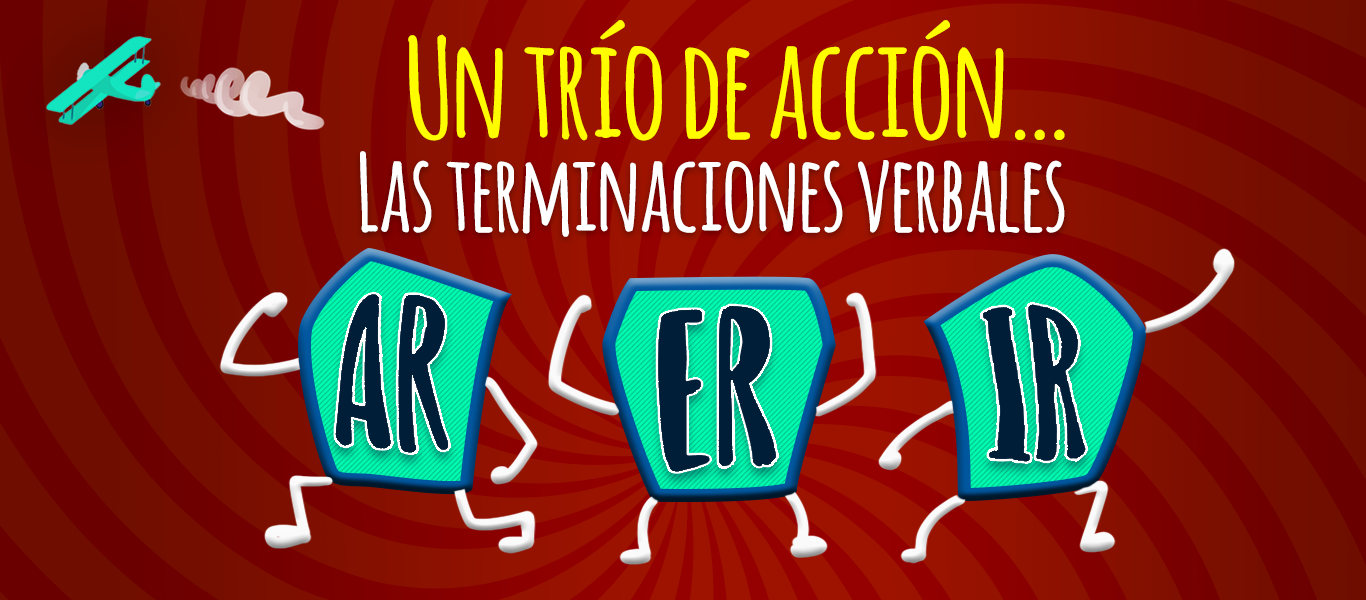✨ A trio of action… Verbal endings –AR, -ER, -IR

Verbs indicate action, what happens, or what is done. And in Spanish, the 3 categories or conjugations are divided, according to their ending. The infinitive is the form used to enunciate verbs and the three endings are –ar, -er, -ir. Verbs can be grouped depending on their ending in the first, second or third conjugation.
ÍNDICE DE CONTENIDOS
I show you the 3 conjugation models of the regular verbs, in the simple tenses. In another article, we can talk about compound times. You should know that the root of the verb will never change, that’s why we call them regular, what changes are the last letters.
Verbs ending in AR
First conjugation
They are all those regular verbs ending in AR, such as sing, love, dance, ask, drive, etc.
| INDICATIVE MODE | ||||
| SIMPLE TIMES | ||||
| PRESENT | PERFECT SIMPLE PRETERITE / PRETERITE | FUTURE | IMPERFECT / COPRETERY PRETERIT | SIMPLE CONDITIONAL / POST-PRETERIT |
| Amo | Amé | Amaré | Amaba | Amaría |
| Ama | Amaste | Amarás | Amabas | Amarías |
| Amas | Amó | Amará | Amaba | Amaría |
| Amamos | Amamos | Amaremos | Amábamos | Amaríamos |
| Amáis | Amasteis | Amaréis | Amabais | Amaríais |
| Aman | Amaron | Amarán | Amaban | Amarían |
| SUBJUNCTIVE MODE | ||
| SIMPLE TIMES | ||
| PRESENT | PERFECT SIMPLE PRETERITE / PRETERITE | FUTURE |
| Ame | Amara o amase | Amare |
| Ames | Amaras o amases | Amares |
| Ame | Amara o amase | Amare |
| Amemos | Amáramos o amásemos | Amáremos |
| Améis | Amarais o amaseis | Amareis |
| Amen | Amaran o amasen | Amaren |
| IMPERATIVE MODE | ||
| SIMPLE TIMES | ||
| Ama | ||
| Ame | ||
| Amemos | ||
| Amad | ||
| Amen | ||
| FORMAS NO PERSONALES | ||
| INFINITIVE | PARTICIPLE | GERUND |
| Amar | Amado | Amando |
Verbs ending in ER
Second conjugation
They are all those regular verbs ending in ER, such as temer, leer, resolver, comer, oler, etc.
| INDICATIVE MODE | ||||
| SIMPLE TIMES | ||||
| PRESENTE | PERFECT SIMPLE PRETERITE / PRETERITE | FUTURE | IMPERFECT / COPRETERY PRETERIT | SIMPLE CONDITIONAL / POST-PRETERIT |
| Como | Comí | Comeré | Comía | Comería |
| Comes | Comiste | Comerás | Comías | Comerías |
| Come | Comió | Comerá | Comía | Comería |
| Comemos | Comimos | Comeremos | Comíamos | Comeríamos |
| Coméis | Comisteis | Comeréis | Comíais | Comeríais |
| Comen | Comieron | Comerán | Comían | Comerían |
| SUBJUNTIVE MODE | ||
| SIMPLE TIMES | ||
| PRESENT | PERFECT SIMPLE PRETERITE / PRETERITE | FUTURE |
| Coma | Comiera o comiese | Comiere |
| Comas | Comieras o comieses | Comieres |
| Coma | Comiera o comiese | Comiere |
| Comamos | Comiéramos o comiésemos | Comiéremos |
| Comáis | Comierais o comieseis | Comiereis |
| Coman | Comieran o comiesen | Comieren |
| IMPERATIVE MODE | ||
| SIMPLE TIMES | ||
| Come | ||
| Coma | ||
| Comamos | ||
| Comed | ||
| Coman | ||
| FORMAS NO PERSONALES | ||
| INFINITIVE | PARTICIPLE | GERUND |
| Comer | Comido | Comiendo |
Verbs ending in IR
Third conjugation
They are all those regular verbs ending in IR, such as salir, sentir, vivir, pedir, reír, etc. (going out, feeling, living, asking, laughing, etc.)
| INDICATIVE MODE | ||||
| SIMPLE TIMES | ||||
| PRESENT | PERFECT SIMPLE PRETERITE / PRETERITE | FUTURE | IMPERFECT / COPRETERY PRETERIT | SIMPLE CONDITIONAL / POST-PRETERIT |
| Vivo | Viví | Viviré | Vivía | Viviría |
| Vives | Viviste | Vivirás | Vivías | Vivirías |
| Vive | Vivió | Vivirá | Vivía | Viviría |
| Vivimos | Vivimos | Viviremos | Vivíamos | Viviríamos |
| Vivís | Vivisteis | Viviréis | Vivíais | Viviríais |
| Viven | Vivieron | Vivirán | Vivían | Vivirían |
| SUBJUNTIVE MODE | ||
| SIMPLE TIMES | ||
| PRESENT | PERFECT SIMPLE PRETERITE / PRETERITE | FUTURE |
| Viva | Viviera o viviese | Viviere |
| Vivas | Vivieras o vivieses | Vivieres |
| Viva | Viviera o Viviese | Viviere |
| Vivamos | Viviéramos o viviésemos | Viviéremos |
| Viváis | Vivierais o Vivieseis | Viviereis |
| Vivan | Vivieran o Viviesen | Vivieren |
| IMPERATIVE MODE | ||
| SIMPLE TIMES | ||
| Vive | ||
| Viva | ||
| Vivamos | ||
| Vivid | ||
| Vivan | ||
| FORMAS NO PERSONALES | ||
| INFINITIVE | PARTICIPLE | GERUND |
| Vivir | Vivido | Viviendo |
Now you can practice with the different verbs in Spanish and learn their conjugations. What a success!


